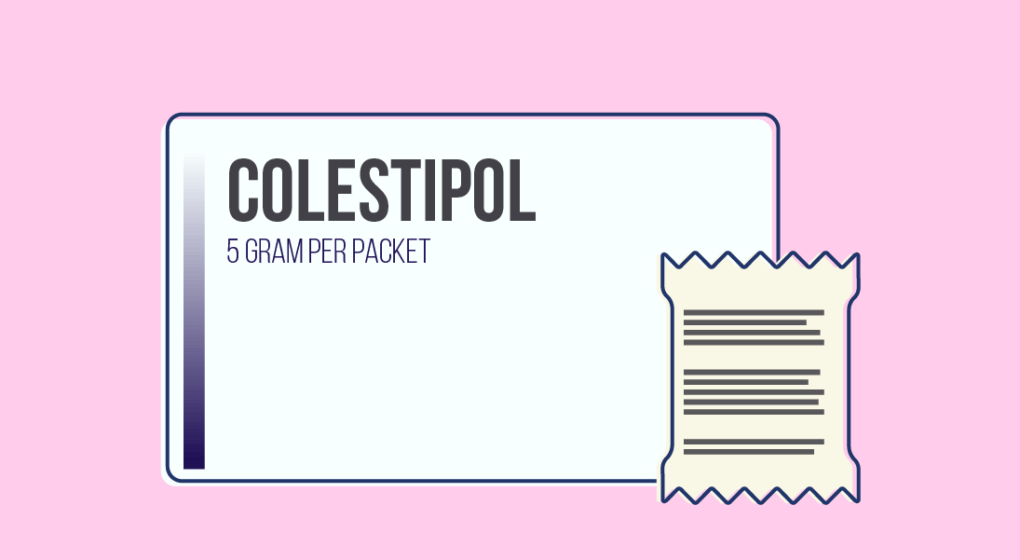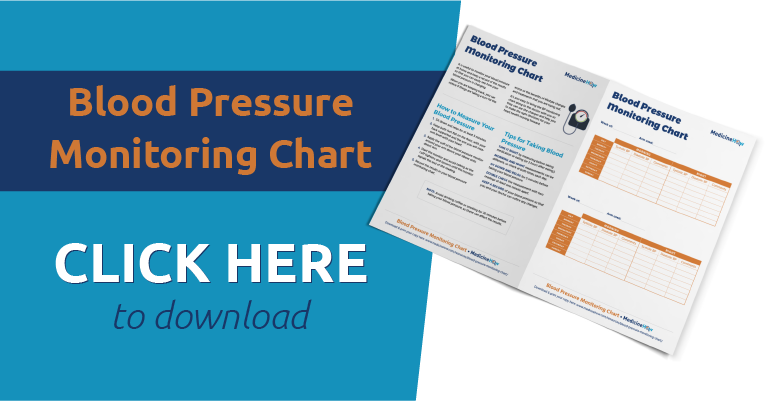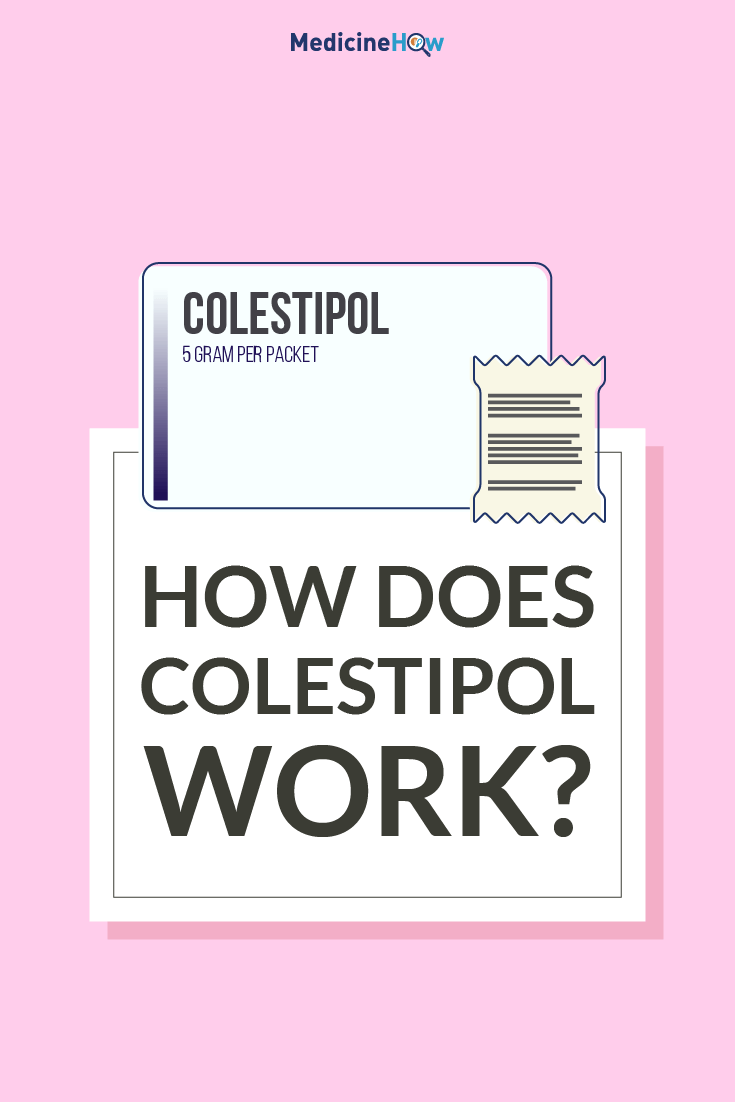
Colestipol is a type of drug called a bile acid binding resin that works by binding to the bile acids in the intestinal lumen so that they can’t be absorbed into the bloodstream. This helps to reduce the LDL cholesterol in your blood and reduce your risk of cardiovascular events such as heart attack and stroke.

Brand Names and Doses
![]() Colestipol is the generic name of the drug, which is the active component that has an effect on your body. You may also know it by the brand name, the name given by the drug manufacturing company, which is Colestid.
Colestipol is the generic name of the drug, which is the active component that has an effect on your body. You may also know it by the brand name, the name given by the drug manufacturing company, which is Colestid.
Colestid is available in a powder form in sachets, which can be mixed with water or another fluid to be taken as a dose.
Most people begin taking one 5 g sachet once or twice a day and the dose can gradually be increased until the LDL cholesterol in your blood reaches a safer level. Most people will eventually take 2-6 sachets per day in 2-4 separate doses.
Your doctor will usually schedule a follow-up appointment about a month after starting to take colestipol to monitor the effects of the drug and make changes if needed. This allows your body time to adjust to the drug and reduces the risk of side effects, rather than starting with a dose that is too high.
What type of drug is it?
![]() Colestipol is a type of drug called bile acid binding resin.
Colestipol is a type of drug called bile acid binding resin.
Cholestyramine is another drug in this class that works in a similar way to bind to bile acids and stop them from being absorbed into the blood stream. Both of these medications can be used to lower LDL cholesterol and help to prevent cardiovascular events such as heart attack and stroke.
What is colestipol used for?
![]() Colestipol is usually used to manage hypercholesteremia, particularly high levels of LDL cholesterol in your blood.
Colestipol is usually used to manage hypercholesteremia, particularly high levels of LDL cholesterol in your blood.
It is more effective in lowering the LDL cholesterol than HDL cholesterol and triglyceride levels, so it is often used if you have particularly high LDL cholesterol.
Keeping the LDL cholesterol at a safe level is important if you have a high cardiovascular risk and are more likely to have a heart attack or stroke. Lower levels of cholesterol in your blood make it more difficult for plaque to form and block the blood flow, which will help to protect you from cardiovascular events.
Colestipol should only be used in combination with diet and lifestyle alterations and not as a substitute for healthy living choices.
How does colestipol work?
![]() Bile acids resins like colestipol work by attaching to bile acids in the intestinal lumen and preventing them from being absorbed in the blood and the rest of the body.
Bile acids resins like colestipol work by attaching to bile acids in the intestinal lumen and preventing them from being absorbed in the blood and the rest of the body.
This means that more of the cholesterol in your body will be needed to produce bile acids in the body and maintain the natural balance. As a result, the concentration of LDL cholesterol in the blood will decrease.
This is useful to prevent cardiovascular events because LDL cholesterol is involved in the production of plaque in the blood vessels. This plaque can build up (atherosclerosis) and obstruct or block the flow of blood and potentially cause cardiovascular events such as a heart attack (myocardial infarction) or stroke.
Side Effects
![]() Most patients can take colestipol without any noticeable side effects but you may notice some changes such as:
Most patients can take colestipol without any noticeable side effects but you may notice some changes such as:
- Constipation
- Abdominal pain
- Heartburn
- Flatulence
- Nausea
- Vomiting or diarrhea
If you notice any of these side effects, it is likely that the dose of colestipol is too high and you should talk to your doctor about lowering the dose to reduce the effects.
It’s worthwhile to be aware of the possible side effects of colestipol so that you can recognize the signs and talk to your doctor about decreasing the dose if needed.
Precautions
![]()
There are some people who shouldn’t take or need extra care when taking colestipol.
- It can exacerbate hypertriglyceridemia, so isn’t usually recommended if you have high triglyceride levels.
- It can worsen diverticular disease and hemorrhoids, so isn’t usually recommended if you are affected.
- It can worsen constipation (constipation is a common side effect) so if you are affected and need to take cholestyramine your doctor may also recommend a laxative medication
Additionally, it is not effective if you have complete biliary obstruction, as this is where the drug has its effect. Therefore, if you are affected another medication would be more useful.
Drug Interactions
![]() Colestipol can reduce the efficacy of several other drugs that you may take because it can also stop the drugs from being absorbed from the intestine as well as they usually would. Drugs that can be affected include:
Colestipol can reduce the efficacy of several other drugs that you may take because it can also stop the drugs from being absorbed from the intestine as well as they usually would. Drugs that can be affected include:
- Diclofenac
- Digoxin
- Ezetimibe
- Gemfibrozil
- Hydrochlorothiazide
- Hydrocortisone
- Statins
- Tetracycline
In most cases you can take both drugs together, but you will need to separate the doses so that they are absorbed from the intestine close to normally. Your doctor will usually advise you to take these drugs 1 hour before or 4-6 hours after taking colestipol.

Pregnancy and Breastfeeding
![]() Colestipol can sometimes be used in pregnancy under the advice of a medical specialist, depending on the particular circumstances. If you take colestipol and are trying to conceive, it is best to talk to your doctor about your options and the best choice for you.
Colestipol can sometimes be used in pregnancy under the advice of a medical specialist, depending on the particular circumstances. If you take colestipol and are trying to conceive, it is best to talk to your doctor about your options and the best choice for you.
Colestipol is not recommended for women who are breastfeeding due to the effect it could have on the baby if excreted in breast milk.
Pin it!


